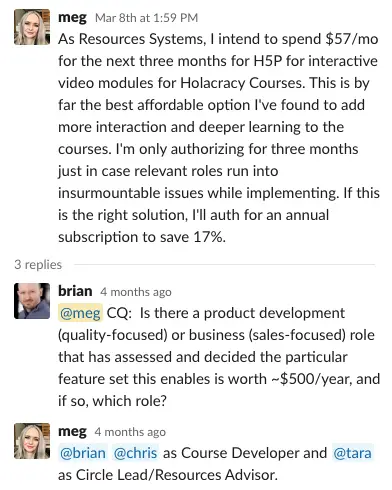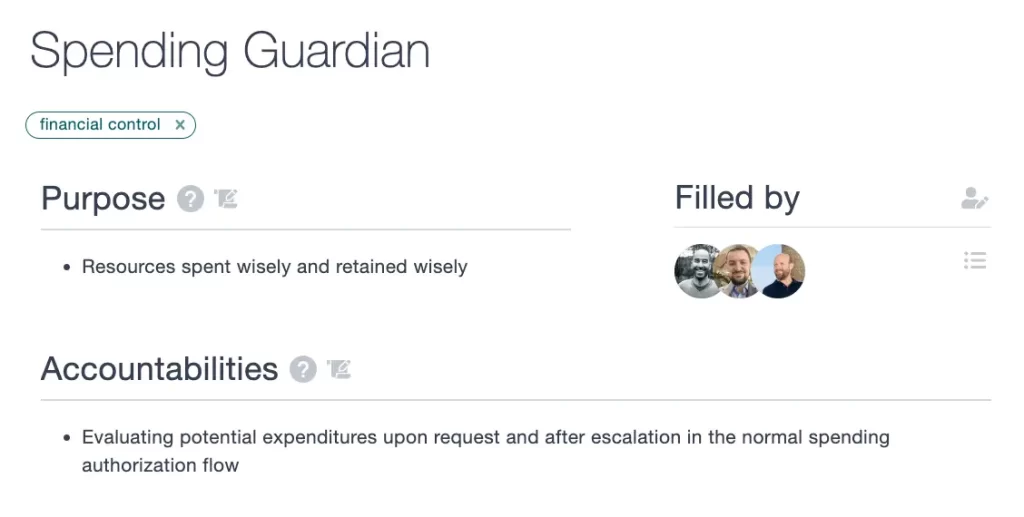
Self-management can be an inspiring concept, and many people like the idea of doing away with bosses. Others are confused by it, and wonder how anything gets done without someone in charge. When it comes to the nuts and bolts of everyday business in a self-managing company — hiring and firing, setting compensation, authorizing spending, and so on — the question quickly arises: who decides? If one person no longer has autocratic power, you’ll need a new approach.
If you’ve tried making such decisions by consensus, you’ve probably discovered that’s rarely very efficient or effective. And if you simply avoid having any explicit power structure for making these decisions, you’re likely to end up with a less-than-ideal implicit power structure where office politics and personal relationships hold too much sway. A self-managing organization needs to create processes to handle these everyday functions without a boss calling the shots.
In my experience, there is no one-size-fits-all solution that works for every organization for major decisions or processes like these. Rather, you’ll need to create custom solutions that work for your particular company. In the growing community of self-managed organizations, many are developing their own unique versions of these kinds of core business processes, and often exchanging ideas and building on top of the best practices of others. Using a robust self-management framework like Holacracy makes this kind of process development even easier by adding a clear “meta-process” to iterate on all of your other processes. In this series of posts, I’ll share a few examples of processes we’ve developed and continue to evolve at HolacracyOne, in the hopes of inspiring you to think creatively about your own processes.
Keep in mind that these examples were custom-designed for our unique organization. Will they work for everyone? No, and they’re not intended to. They’re specific to our business needs and culture, although other organizations have copied them or derived their own processes based on them. It’s also worth noting that none of these started out as fully realized processes — they began as much simpler, half-baked versions that were then iterated on, using Holacracy’s governance meeting process, until we’d ironed out the kinks. Now they’re working pretty well for us. And they’re also still evolving, as new issues arise and we adapt.
Spending Authorization
Anyone can spend any money they see fit to spend, for any purpose that serves one of their roles, as long as they first announce their intention to spend.
Many years ago, one of my roles controlled all spending in the organization. And that worked just fine, for a while. Then one day, a team member asked me for a budget for a purpose that made no sense to me. When I questioned her about it, she confessed that she didn’t think it made sense either, but a colleague had asked her to make the purchase in her role, and she just passed on the request for me to decide. That’s when I realized that I didn’t want people deferring their good judgment around spending decisions to me any longer — I wanted a system that encouraged people to own their autonomy and use their best judgment to figure out what spending made sense.

Keep in mind that our company’s specific situation doesn’t require a tightly controlled budgeting process. Our main concern is just ensuring that spending is intelligent and useful. Other companies might need a budget system that involves more forecasting and control, so the process they might create would look very different. In our case, here’s the policy we came up with: Anyone can spend any money they see fit to spend, for any purpose that serves one of their roles, as long as they first announce their intention to spend (we use a Slack channel for this). It’s not a request for permission, but a statement: “In my role of X, I intend to spend Y dollars on Z purpose.”
For small spends, that’s all that’s required — they can then go ahead. For moderate-sized spends, there’s a 48-hour waiting period where people have the chance to question or share reactions to the proposed spending, and, if they feel it’s unwise, they can escalate the process to a deeper review by a small group of Spending Guardian role-fillers. If no one does this, after 48 hours the spending is automatically authorized. For larger expenses, in addition to that waiting period, at least two other team members need to attest that they would make the same decision if they were in the spender’s role (we indicate this with a money-bag icon added as a reaction to the original spender’s Slack post).
I’ve found that this process really facilitates people owning their autonomy and power, while still keeping the organization relatively safe from poor spending decisions. Everyone can use their best judgment on what to spend, but only by giving transparency and enough of a delay to allow others to get involved and try to improve the decision, perhaps by asking questions, sharing information to consider, or, when needed, escalating the decision to a deeper review process.
Without a Boss, Who Decides?
This article is the first part in a three-part series.
- Part 1 — From Bosses to Processes: How a Self-Managed Company Controls Spending
- Part 2 — A Self-Directed Compensation System
- Part 3 — Getting Fired Without a Boss
To learn more about self-management, join a community of pioneers and check out our e-learning suite → Self-Management Accelerator

